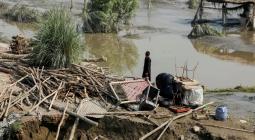COP27 Tackled The Consequences Of Climate Change, But Not The Cause—Fossil Fuels

The agreement to establish a Loss and Damage Fund at the COP27 climate conference in Sharm El–Sheikh, Egypt, is a significant breakthrough, after 30 years of struggle to demand climate justice for the people facing devastating climate impacts.
Vulnerable communities, particularly in developing countries, who have been suffering from supercharged storms, catastrophic floods, raging wildfires and rising sea levels do not receive enough support. There has been a gaping hole in the UN climate finance architecture to help people recover from the impacts fuelled by climate change, and rebuild their lives and livelihoods.
The demand to address climate-induced loss and damage under the UNFCCC was first raised by the Republic of Vanuatu in 1991. Since then, the Alliance of Small Island States (AOSIS) and Least Developed Countries or LDCs have been advocating for concrete measures, which led to the setting up of the Warsaw International Mechanism for Loss and Damage in 2013.
Read more at: https://www.bqprime.com/business/cop27-tackled-the-consequences-of-climate-change-but-not-the-causefossil-fuels
Copyright © BQ Prime
Harjeet Singh Harjeet Singh is the Head of Global Political Strategy at Climate Action Network International and the Global Engagement Director at the Fossil Fuel Treaty initiative. He co-founded a social enterprise, Satat Sampada. He tweets at @harjeet11.




